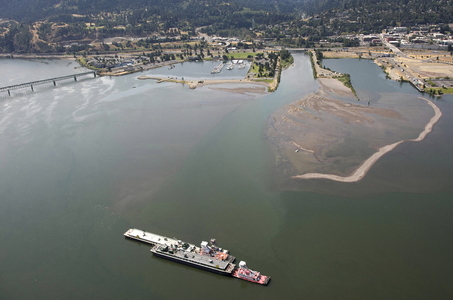forum
library
tutorial
contact

Lessons From a Stuck Barge
by Editorial BoardThe Oregonian, June 21, 2010
|
the film forum library tutorial contact |

|
Lessons From a Stuck Barge
by Editorial BoardThe Oregonian, June 21, 2010 |
 The marine nonevent of last year was when a barge ran aground in the Columbia River off the city of Hood River. It was a nonevent in that the barge went on its merry way after 36 hours of failed attempts to free it from an unseen mud shoal -- only after offloading half its cargo did the barge gain sufficient buoyancy to float free.
The marine nonevent of last year was when a barge ran aground in the Columbia River off the city of Hood River. It was a nonevent in that the barge went on its merry way after 36 hours of failed attempts to free it from an unseen mud shoal -- only after offloading half its cargo did the barge gain sufficient buoyancy to float free.
Its cargo was 1 million gallons of gasoline.
Had the barge ruptured on an unseen rock, the nonevent would have been a daybreak spectacle, then a disaster, with lawsuits still pending. The Columbia's essential values -- heavy industrial and recreational use, coupled with a sensitive ecology supporting wildlife and runs of federally protected salmon -- would have been compromised.
And every minute in the response would have counted.
Now, a just-released U.S. Coast Guard review of the July 9 incident shows a communications breakdown that kept spill response agencies unnotified for at least two hours following the grounding. Oregon's Department of Environmental Quality, Washington's Department of Ecology and the U.S. Environmental Protection Agency -- all were left in the dark by the Coast Guard and the barge's owners, Tidewater Barge Lines of Vancouver.
While Tidewater promptly reported the 3:15 a.m. incident to the Coast Guard and took charge of the situation, the Coast Guard didn't arrive on-scene till 8 a.m. -- nearly five hours after the grounding.
Oops.
Let's be clear: No one tried to get it wrong. After obtaining and reviewing the 11-month-old review, The Oregonian's Scott Learn reported Monday that Tidewater and the Coast Guard had simply judged the grounding of the New Dawn to pose a salvage challenge -- not a spill-prevention challenge or, worse, a pollution crisis.
That's precisely our point. Few things start out as a crisis, least of all a crisis of known scale and consequence. In the case of the New Dawn, we got lucky.
But that wasn't so when the New Carissa, an empty cargo ship fueled with thousands of gallons of bunker oil, did nothing more than anchor in the wrong place off Coos Bay in 1999. For weeks the sea had its wrecking-ball way as agencies and salvors, often miscommunicating and at cross-purposes, tried and failed to stop it.
And it's not the case now with BP's oil well in the Gulf of Mexico, where a safety device failed, triggering an explosion and gusher. The who's-in-charge drama there isn't yet played out.
Tidewater sends more than 400 fuel barges up and down the Columbia each year. The outfit hasn't had a fuel leak in nearly 16 years, an impressive record, though one of its empty grain barges rammed the gate of a navigation lock at John Day Dam, east of The Dalles, in 2008 --it was first in a three-barge chain whose last barge carried 1.7 million gallons of diesel fuel.
We needn't wait for an emergency to adequately prepare for it.
The right agencies with jurisdiction in the Columbia River need to know in real time when something goes wrong, even potentially so. Improvements have been made. But yet stronger, and more widely shared, communication protocols would help put us ahead of the next mishap.
learn more on topics covered in the film
see the video
read the script
learn the songs
discussion forum
